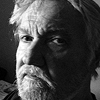
Edward Abbey has been dead for 25 years. Larry McMurty called Abbey our ‘Thoreau of the West’. Abbey, who published seven novels and a score of essays and confessions and travel books all dealing with the American West, was known for his uncompromising point-of-view, his insights, his extrapolations, that cover the whole race, and hold a special resonance for citizens of this desert country.
And, of course, this ongoing work we call fledging democracy. Picking up at random Beyond the Wall, he says regarding a warning sign that the Park Service has posted at the front of some of the caves in the Guadalupe Mountains, some of them probably connected to Carlsbad Caverns, “When did we grant the Park Service the right to protect us from ourselves? Surely any freeborn citizen, qualified or not, has a perfect license to risk his or her fool neck by groping downward through musty darkness into the entrails of the mountains—this mountain or any mountain.”
In a quotidian sign Abbey sees an attack on individual freedom. He sees the assault on his freedoms as paramount to his work. Without his cantankerousness he might miss out on finding the “living heart” of the western wilderness.
Of course Cactus Ed, as his friends called him, was more than a writer of nature and the West; more than a novelist exploring the themes of the Southwest; these stories are rooted in his unblinking look at progress, the kind of progress that rips holes in Mother Earth, gouges out her flesh, denuding the forests, fouling the oceans, probing the bowels of the planet for profits and leaving the future to what?
To those who know his work, Abbey was prescient. When the government built the Glen Canyon Dam, which in 1962 closed the Colorado River just above the Grand Canyon, Abbey said the dam should be taken down because it would kill the natural system— “It is the difference between life and death.”
Thirty-two years later the U.S. Department of Interior admitted that the Grand Canyon was on the verge of being decimated by Glen Canyon. A spokesman for this agency, David Wegner, said “Today, the environmental immune system is so weak below Glen Canyon Dam, that in times of flood, the river could get sicker, and it may never be able to recover biologically.”
In his first book to gain national attention, he wrote about the threat of “industrial tourism” in the national parks. Desert Solitaire (1968) laid out three steps to preserve these treasures for future generations: 1) No more cars in the national parks; 2) No more new roads, and 3) Put the park rangers back to work. The Park Service is implementing, or planning to implement, at least two of his points.
And what about our serious, unrelenting drought? Abbey was forecasting this in that same 1968 book.
Water, water, water….There is no shortage of water in the desert but exactly the right amount, a perfect ration of water to rock, of water to sand, insuring that wide, free, open, generous spacing among plants and animals, homes and towns and cities, which makes the arid West so different from any other part of the nation. There is no lack of water here, unless you try to establish a city where no city should be.
March 14 marks twenty-five years since his passing. He was just sixty-two. Why should we care? Because a great writer’s voice was silenced; because what he stood up for—the natural wilderness— is still, constantly, under attack—because his voice is our voice. Read Desert Solitaire, or Cactus Country, or watch Lonely Are the Brave with Kirk Douglas. Abbey even appears in it playing a sheriff. And especially read the entertaining The Monkey Wrench Gang, the book that sparked the Earth First! movement.
Today, when so few have the guts to speak out, his voice lingers bravely over the whine of diesel motors and earth movers, reminding us that giving up our freedom and our wild places to protect the industrialization of the planet is a poor exchange, and we all come out losers.
He once wrote “We have the right to resist and we have the obligation; not to defend that which we love would be dishonorable.”
Abbey’s credo can be summed up in Samuel Johnson’s challenge that it is the writer’s duty to make the world better. Abbey did what he could; now it is up to us to continue his legacy.



Responses to “The Work of Edward Abbey—Prophet of the West”